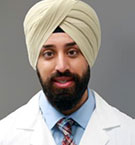Kelli's Story: Mobile ECMO
On June 9, 2024, mother of three Kelli Shaw celebrated her 10-year wedding anniversary with a vow renewal ceremony. It is a milestone she nearly did not live to see following a medical emergency less than a year ago
Corrigan Minehan Heart Center
Contact Information
Corrigan Minehan Heart Center
55 Fruit Street
Boston,
MA
02114
Phone: 617-724-4175
Email: ahorstmann@mgh.harvard.edu
Department Contact
Allegra Hortsmann
Program Manager
The clinical service of the cardiac division at Massachusetts General Hospital offers over 4,000 admissions, 15,000 outpatient visits and 8,000 invasive cardiovascular procedures annually (of these roughly 400 to 500 are dedicated peripheral procedures).
The Vascular Diagnostic and Intervention Fellowship is a one-year program concentrating both on diagnosis and management of patients with peripheral vascular disease, and the performance of percutaneous peripheral vascular procedures. The program is in addition to and complementary to the ACGME-accredited Cardiovascular Disease and Interventional Cardiology fellowship programs.
The Vascular Diagnostic and Intervention Fellowship Program is a one-year GME approved program starting on July 1 of each year.
The central goal of the Vascular Medicine and Intervention Fellowship Program is to provide integrated training in the diagnosis, care and percutaneous treatment of patients with vascular disease. We strive to allow fellows to assume positions of academic leadership in the field of cardiovascular medicine.
This fellowship program provides an opportunity to gain both knowledge and procedural expertise in the evaluation and management of patients with a wide spectrum of vascular diseases including:
The fellow will develop a broad-based knowledge of diagnostic and endovascular interventional techniques for peripheral vascular disease and will acquire the requisite technical skills of invasive diagnostic imaging and interventions. These skills encompass the full repertoire of endovascular techniques, including vascular access, diagnostic angiography and venography, catheter-based angioplasty, thrombectomy/atherectomy, catheter-directed thrombolysis and stenting. In addition, paramount is the prompt recognition and management of associated complications, which will involve various vascular beds.
In addition, the fellow will continue to perform a limited number of coronary interventions to maintain and reinforce his/her expertise in these procedures.
The fellow must have prior cardiology fellowship training, or if arising from a surgical background, should have completed general surgical training, and be preparing for a career in vascular surgery. A prior year of interventional coronary artery training is preferred from cardiology candidates, though this is not required of surgical candidates.
The fellow will be actively involved in both the outpatient and inpatient management of vascular patients, including those residing in the intensive care units and emergency department.
The fellow will participate in the inpatient consultation service. Responding to vascular medicine consultations, the fellow will see and evaluate inpatients with a wide variety of vascular diseases. The fellow will obtain a comprehensive history of the patient’s presentation, perform a disease-centered physical examination, and actively participate in the interpretation of the non-invasive test data, including physiological and duplex ultrasound studies, complemented by cross-sectional imaging when available. The respective cases will be discussed and pertinent physical examination, laboratory and noninvasive study data reviewed by the attending and the fellow. The fellow will be trained to integrate the patient’s entire medical/clinical presentation and non-invasive data to make accurate diagnoses and appropriate clinical decisions with respect to further invasive assessment of the patient and therapeutic interventions. The merits of medical versus endovascular versus surgical therapy will be discussed for each case by the attending and fellow. Written consultation will be provided addressing the pertinent issues relevant to the patient.
The fellow will see patients along with an attending from the vascular medicine section in the outpatient setting. As described in the inpatient consultation section above, the fellow will be involved in the evaluation and management of patients in the clinic setting as well. Outpatient follow-up will be performed for all the patient groups as outlined above.
The development and mastering of excellent vascular angiographic and interventional skills will be paramount for the fellow. Under guidance of the attending physician responsible for the procedure, the fellow will acquire the skills of diagnostic angiography and catheter-based interventions within the peripheral vasculature. The fellow will be expected to participate in the procedural care of patients that he/she has cared for clinically, either in an outpatient or inpatient setting. The fellow will be trained to use appropriate endovascular invasive techniques to improve symptoms, reverse critical ischemia, and avert or limit the extent of vascular bypass surgery necessary in patients with peripheral artery disease. The fellows will acquire the following major procedural skills:
The fellow will be trained in different techniques of gaining safe and secure vascular access with ultrasound-guidance including:
The fellow will learn which approach is appropriate for the percutaneous treatment of target lesions in various peripheral arteries, including the external iliac, common femoral artery, superficial femoral artery, tibial vessels, renal artery, subclavian and carotid arteries.
The fellow will be exposed to appropriate vascular imaging techniques applied for visualization of various vascular beds. He/she will learn the radiographic views to evaluate:
The fellow will learn to use the appropriate diagnostic catheters and angiographic views to identify the sites of atherosclerotic (or other etiology) obstruction, delineate the severity of the stenoses, and determine if the patient is suitable for endovascular and/or surgical intervention.
The fellow will be trained in the selection and use of guiding catheters, guidewires, balloon catheters, atherectomy devices and stents designed for the peripheral vasculature. He/She will be trained to perform the critical interventions applied in endovascular interventions including:
The fellow will develop an understanding of the impact of patient characteristics, target vessel location and lesion morphology on the technical and clinical success rate of percutaneous interventions.
The strengths and limitations of differing percutaneous interventional approaches, including balloon angioplasty, atherectomy devices, drug-coated balloons and both balloon-expandable and self expanding stents, and other commonly used interventional devices will be discussed by the attending with the fellow.
The fellow will be trained in the management of mechanical complications of peripheral vascular interventions including dissection, thrombosis, spasm, perforation, embolization and acute vessel thrombosis.
The fellow will attend and actively participate in the following regularly scheduled teaching programs including:
Fellows will have the opportunity and are expected to provide teaching to medical students, interns and residents, other fellows and staff. They are expected to present in the above educational conferences.
The fellow will be evaluated regularly (twice during the year) in oral and form by the attending physicians participating in instruction and supervision of this fellowship program. The attending will regularly provide verbal and written feedback to the fellow about his/her performance. The fellow will also have the opportunity to evaluate their staff physicians and the quality of teaching/instruction in written form.
All positions have been filled for 2025-2026.
Applications are accepted on a rolling basis up to a year prior to the intended start date. The program starts on July 1st of each year. To submit an application, please submit the following documents in one PDF file to the Dropbox Application Portal:
Learn more about the faculty of the Vascular Diagnostic and Intervention Fellowship.
 Priti Mehla, MD
Priti Mehla, MDInterventional Cardiology Fellowship: Thomas Jefferson University Hospital, Philadelphia, PA
Cardiovascular Medicine Fellowship: Danbury Hospital, Danbury, CT
Medicine Residency: University of Connecticut, Farmington, CT
Medical School: Pt. B.D.S. University of Health Sciences, Rohtak, India
 Inderjit Singh, MD
Inderjit Singh, MDInterventional Cardiology Fellowship: Albert Einstein Medical Center Philadelphia, PA
Cardiovascular Medicine Fellowship: Rutgers New Jersey Medical School, Brunswick, NJ
Medicine Residency: Drexel University College of Medicine, Philadelphia, PA
Medical School: Windsor University School of Medicine, Canyon, St. Kitts and Nevis
 Ganesh Thirunavukkarasu, MD
Ganesh Thirunavukkarasu, MDInterventional Cardiology Fellowship: George Washington University, Washington D.C.
Cardiovascular Medicine Fellowship: State University of New York-Downstate, Brooklyn NY
Medicine Residency: State University of New York-Downstate, Brooklyn NY
Medical School: Chengalpattu Medical College, India
As part of the largest teaching hospital of Harvard Medical School, we train residents, fellows and current providers in innovative therapies.
Information for health care professionals about the latest cardiovascular breakthroughs, research and clinical advances from Mass General.
Mass General provides a welcoming and supportive environment for employees of all ethnic backgrounds, ages, lifestyles and physical abilities.
On June 9, 2024, mother of three Kelli Shaw celebrated her 10-year wedding anniversary with a vow renewal ceremony. It is a milestone she nearly did not live to see following a medical emergency less than a year ago
This scientific statement outlines the current state-of-the-art on the use of artificial intelligence (AI), machine learning (ML) and data science in the diagnosis, classification and treatment of cardiovascular disease.
Uncontrolled blood pressure puts people at increased risk of developing heart disease, brain disease, and kidney disease, yet only one in four people have their blood pressure under good control.
New study shows that being sedentary increases the risk of the most common types of heart disease, even among those who get enough exercise
Noli Taylor’s ongoing chest tightness was more than minor pains. When scans revealed a rare congenital heart anomaly, clinicians at Martha’s Vineyard Hospital collaborated with experts at Mass General to diagnose the condition and perform a successful surgery to repair it.
Researchers from Mass General have found that engaging in recommended weekly amounts of physical activity—either concentrated in one to two days or spread throughout the week—may reduce the risk of a broad range of conditions.
On June 9, 2024, mother of three Kelli Shaw celebrated her 10-year wedding anniversary with a vow renewal ceremony. It is a milestone she nearly did not live to see following a medical emergency less than a year ago
This scientific statement outlines the current state-of-the-art on the use of artificial intelligence (AI), machine learning (ML) and data science in the diagnosis, classification and treatment of cardiovascular disease.
Uncontrolled blood pressure puts people at increased risk of developing heart disease, brain disease, and kidney disease, yet only one in four people have their blood pressure under good control.
New study shows that being sedentary increases the risk of the most common types of heart disease, even among those who get enough exercise